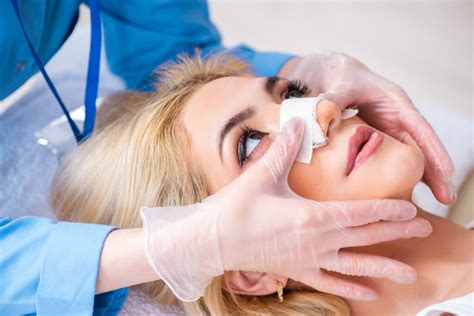Preparing for rhinoplasty surgery involves careful planning and attention to detail to ensure a smooth experience and optimal results. From consulting with your surgeon to gather a personalized surgical plan to understanding the potential risks and benefits, each step is crucial in your journey towards enhancing your facial aesthetics. It’s important to also collect your medical records, create a comfortable recovery environment at home, and secure transportation for the day of the procedure.
Following pre-operative instructions diligently can significantly affect your recovery and the surgery’s success. This guide will walk you through essential steps to help you feel confident and ready for your upcoming rhinoplasty.
Contents;
Consult With Your Surgeon For Personalized Surgical Plan

When embarking on the journey of undergoing rhinoplasty, it is crucial to recognize the importance of consulting with your surgeon in order to develop a personalized surgical plan that aligns with your unique anatomical structure, aesthetic goals, and medical history, as this can significantly influence the outcome of the surgery and enhance your overall satisfaction.
Through this initial consultation, a comprehensive discussion can take place, allowing you to share your expectations and concerns while your surgeon can provide insights into the various techniques available, potential risks, and the recovery process, all tailored specifically to your needs. Therefore, investing time in preparing for this consultation can be invaluable, ensuring that you foster a clear understanding of how your unique attributes will play a role in the surgical approach taken.
- Prepare a list of questions regarding the surgery and recovery.
- Bring photographs that illustrate your desired results.
- Be ready to discuss your complete medical history, including medications and allergies.
During your meeting with the surgeon, it is essential to openly communicate your vision for the procedure and to seek clarification on any points that may be unfamiliar or concerning, as this transparency will pave the way for a collaborative relationship and ultimately lead to more satisfactory results. Surgeons typically use various techniques in rhinoplasty, such as open or closed approaches, and understanding the nuances of these options can empower you to make informed choices that cater to your aspirations. Moreover, they may utilize imaging technology to simulate potential results, which can serve as an excellent visual aid in aligning your expectations with what is realistically achievable.
| Consultation Focus | Details |
|---|---|
| Aesthetic Goals | Discuss the changes you wish to see in your nose’s appearance, including size, shape, and proportion. |
| Medical History | Share any past surgeries, health conditions, and allergies to guide surgical planning and anesthesia use. |
| Surgical Techniques | Learn about the different rhinoplasty techniques and which may be best suited for your individual case. |
Engaging with your surgeon about a personalized surgical plan elevates your chances of a successful outcome as it prompts an in-depth exploration of the various dimensions that contribute to a successful rhinoplasty, ensuring that your procedure is not only technically proficient but also aesthetically harmonizing with your overall facial structure. Furthermore, this consultation can also serve as an opportunity to establish a rapport and gauge the surgeon’s expertise and suitability for your specific circumstances, giving you additional confidence in your choice of surgeon.
Ultimately, by thoroughly preparing for this critical step, you are not only taking proactive measures to set realistic expectations but are also laying the groundwork for a smoother surgical experience, thereby enhancing your journey toward achieving your desired rhinoplasty results.
Understand The Risks And Benefits Of Rhinoplasty Surgery

Rhinoplasty, commonly known as a nose job, is a surgical procedure that can significantly alter the appearance of your nose, enhance facial harmony, and even improve breathing, but it is essential to have a thorough understanding of the associated risks and benefits before proceeding with the operation, as knowing what to expect can help patients make informed decisions while preparing for their rhinoplasty. By weighing these risks and benefits carefully, individuals can approach their surgery with realistic expectations and an appropriate mindset, thus fostering a smoother recovery process and potentially boosting their satisfaction with the surgical outcomes.
Among the primary benefits of rhinoplasty surgery are not only the opportunity for aesthetic enhancement, which often leads to increased self-esteem and confidence, but also the potential improvement of nasal function for those suffering from structural issues, such as a deviated septum, which can cause chronic breathing problems. Another significant advantage is that rhinoplasty can correct trauma or congenital deformities, allowing patients to attain a more natural and harmonious balance with their facial features while eliminating any discomfort caused by previous nasal injuries or birth defects.
However, as with any surgical procedure, rhinoplasty is not without its risks, and potential patients should be aware that complications may arise, including but not limited to infection, scarring, and dissatisfaction with the aesthetic result after surgery. Furthermore, patients might experience swelling and bruising in the immediate post-operative period, which can obscure the final outcome for several weeks or even months. In some cases, patients may require revision surgery to achieve their desired results, which adds both emotional and financial considerations to the overall experience.
- Risk of infection and complications during recovery
- Potential for dissatisfaction with surgical outcomes
- Unpredictable recovery and the need for revision surgery
- Swelling and bruising that can obscure results initially
- Possibility of scarring
As such, the decision to undergo rhinoplasty should not be taken lightly, and thorough discussions with a qualified surgeon can provide invaluable insight into the specific risks related to individual health circumstances and desired outcomes, thereby enabling a tailored approach to the surgical process. It is also crucial for patients to maintain open communication with their healthcare provider, as this can help facilitate a clearer understanding of the steps involved in preparation for surgery, as well as the requisite post-operative care needed to promote healing.
Ultimately, possessing a well-rounded grasp of both the risks and benefits of rhinoplasty surgery is paramount, as it empowers individuals to make decisions that are in alignment with their personal goals and overall well-being when considering how to prepare for your rhinoplasty.
Gather Necessary Medical Records And Health Information
When embarking on the journey of rhinoplasty surgery, one of the most crucial steps in how to prepare for your rhinoplasty involves gathering all necessary medical records and health information that could play a significant role in your surgical process, as these documents will not only help your surgeon understand your medical history but will also assist in formulating a personalized surgical plan that suits your unique needs and goals. It is essential to compile a comprehensive array of documents, including any previous surgical records, medical diagnoses, medications you are currently taking, allergies, and any existing health conditions, to ensure that your surgeon is fully informed and can make the most appropriate recommendations tailored to your specific situation.
In addition to obtaining your medical records, you should also be ready to disclose pertinent lifestyle information, including whether you smoke, consume alcohol, or have recently experienced any significant life changes that might impact your surgery or recovery process, as all of these factors can influence the outcome of your rhinoplasty and your overall health during the recovery phase. As you gather this information, consider reaching out to your primary care physician or any specialists you may have seen in the past to obtain additional documentation that could be relevant, and do not hesitate to ask for clarification on how this information will be used in your surgical planning, as open communication is vital for a successful surgical experience.
To assist you in this process, here’s a helpful list of essential medical records and health information to gather prior to your rhinoplasty consultation:
- Previous surgical records, especially related to your nose and facial structures.
- Current medications, including prescription and over-the-counter drugs.
- Records of any allergies, particularly medication-related allergies.
- Details of any existing health conditions, such as chronic illnesses or respiratory issues.
- Documentation from other healthcare providers or specialists, if applicable.
Equipped with all this information, you will not only reduce the chances of any unforeseen complications arising during your rhinoplasty surgery but also help your medical team provide you with the utmost care and the best possible outcomes in achieving your aesthetic goals, ultimately leading to a smoother surgical experience overall. Rememb
Prepare A Post-Surgery Recovery Space At Home

When considering the nuances associated with post-operative care following rhinoplasty, it is crucial to create a recovery space at home that not only facilitates healing but also ensures that your needs are met during the initial, often uncomfortable days following the procedure. The environment in which you recuperate should be organized with essential items laid out in a way that minimizes your need to exert unnecessary effort while also providing comfort and support through this healing process. Therefore, a well-prepared recovery space can contribute significantly to how effectively you cope with any discomfort and help you manage your overall recovery experience.
To effectively prepare your post-surgery recovery space, consider incorporating the following elements that cater as much to your physical needs as they do to your mental well-being:
- A Comfortable Sleeping Area: Select a room with a cozy bed, lots of pillows to prop yourself up, and soft blankets to keep warm.
- Essential Supplies: Have a supply of tissues, ice packs, medications, and first-aid items readily accessible to attend to any immediate needs.
- Entertainment: Prepare an array of books, movies, or podcasts to keep your mind occupied during the recovery phase.
- Hydration and Snacks: Place a water bottle and easy-to-eat snacks within reach to maintain your energy levels without having to get up frequently.
- Comfortable Clothing: Wear soft, loose-fitting clothes to minimize any discomfort around your face and allow for easy movement.
In addition to these key elements, it is also essential to arrange the furniture in your chosen recovery space thoughtfully, ensuring that pathways are clear and that everything you might need is at your fingertips, allowing you to focus solely on your recovery without distractions or unnecessary strain. Consider placing a small table beside your bed or resting area where you can keep your phone, remote, and other essentials so that you won’t have to get up frequently for items that might otherwise be out of reach, thereby aiding your overall comfort and reducing any risk of a fall or mishap.
| Essential Item | Purpose |
|---|---|
| Pillows | To elevate your head and minimize swelling |
| Ice Packs | To reduce swelling and relieve discomfort |
| Medications | Pain relief and post-operative care |
| Tissues | For any nasal drainage following surgery |
| Hydration | To maintain energy levels |
By assessing your personal needs and preferences when establishing this space, you actively take steps to make the healing period as easy and effective as possible, which is essential for a smooth recovery following rhinoplasty. Remember that although the healing process comes with its set of challenges, a well-organized recovery space can offer you the comfort and reassurance you need, enabling you to rest well and focus on your healing journey without unnecessary distractions or discomfort. Ultimately, as you learn how to prepare for your rhino
Arrange Transportation For The Day Of Surgery
When preparing for your rhinoplasty surgery, one of the most critical tasks on your checklist is to arrange transportation for the day of the procedure, as it is essential to ensure that you have a reliable means of getting to and from the surgical facility without the stress of navigating public transport or relying on someone who may not be available when you need them. Undergoing rhinoplasty, like any surgery, can lead to sedation, disorientation, or discomfort, which makes it unwise for you to drive yourself home afterward, and that is why discussing your transportation plans with a trusted friend or family member who can be on standby once your procedure is complete is invaluable.
Additionally, it is crucial to communicate the details of your surgery, including the time and location, with the person who will be transporting you on the day of your rhinoplasty to avoid any confusion or last-minute issues that might hinder your journey to the surgical facility, thus ensuring that you arrive on time, which is vital for a smooth operation day. Remember, “Being prepared is the key to success,” and this adage is especially pertinent when it comes to making the necessary arrangements for transportation since alleviating any potential stressors can significantly enhance your overall experience leading up to the surgery.
Here are a few tips to keep in mind while arranging transportation for the day of your rhinoplasty surgery:
- Schedule Pick-Up Times: Confirm the pick-up and drop-off times with your driver to prevent any delays.
- Know Your Route: Discuss the best route to the surgical facility ahead of time to avoid any traffic-related issues on the day of surgery.
- Prepare for Post-Operative Care: Ensure your driver is aware of any post-surgery instructions or care you may need immediately after the surgery.
- Notify the Surgical Center: In some cases, the surgical facility may require that they are informed about your transportation arrangements, so it’s a good idea to check with them too.
- Consider Backup Options: Have a backup plan, such as a taxi or ride-sharing app, in case your primary transportation falls through.
By meticulously planning your transportation for the day of your rhinoplasty surgery, you will create a more seamless collaboration between all the components involved in your surgical experience, allowing you to focus on your recovery rather than worrying about how you will get home after the procedure. So remember to communicate clearly, plan ahead, and trust the people around you to help you navigate this import
Follow Pre-Operative Instructions For Optimal Results
When it comes to ensuring a successful outcome for your rhinoplasty, one of the most critical steps you can take involves diligently following the pre-operative instructions provided by your surgeon, as these guidelines are specifically tailored to prepare your body for the surgical procedure and contribute significantly to the overall health of your recovery process.
It is essential to understand that these instructions may cover a variety of important aspects, including dietary restrictions, medication adjustments, and pre-operative testing, all of which play a vital role in minimizing potential complications and maximizing your safety during surgery. By adhering closely to these recommendations, you not only contribute to a smoother surgical experience, but you also lay a solid foundation for optimal healing and aesthetic results following your rhinoplasty.
- Avoid certain medications: Be mindful of medications you are currently taking, particularly those that may affect blood clotting, such as aspirin or non-steroidal anti-inflammatory drugs (NSAIDs); your surgeon will likely provide you a list of specific medications to avoid prior to your surgery.
- Stay hydrated: It is advisable to drink plenty of water in the days leading up to your surgery, as proper hydration can enhance your body’s ability to heal post-operation.
- Limit alcohol and tobacco: Abstaining from alcohol and tobacco use is crucial in the time leading up to your procedure; both substances can interfere with your body’s natural healing process and can increase the risk of complications.
In addition to avoiding certain substances, it is imperative to maintain an open line of communication with your surgical team, as discussing any health changes, concerns, or questions you may have at any time before your rhinoplasty can greatly assist them in fine-tuning your pre-operative instructions to best suit your specific needs and circumstances.
Furthermore, understanding the timeline of the pre-operative process is vital; be sure to ask your surgeon about how far in advance you need to complete any required tests, such as blood work or medical examinations, which are essential in providing valuable insights into your overall health and readiness for surgery. All of these components combine to create a solid pre-operative plan that can greatly influence your rhinoplasty experience.
| Pre-Operative Instructions | Importance |
|---|---|
| Avoid blood thinners | Reduces risk of excessive bleeding |
| Stay hydrated | Facilitates better recovery |
| Quit smoking | Improves healing and reduces complications |
Overall, adhering to the pre-operative instructions provided by your surgeon not only protects your immediate health but also supports the long-term success of your rhinoplasty, allowing you to achieve the desired aesthetic results you have been looking forward to. It is important to remember that your medical team has extensive experience and knowledge in guiding patients through this process, so do not hesitate to reach out for clarification on any aspect of the instructions you may find confusing or concerning. By putting in the effort to follow these essential pre-operativ
